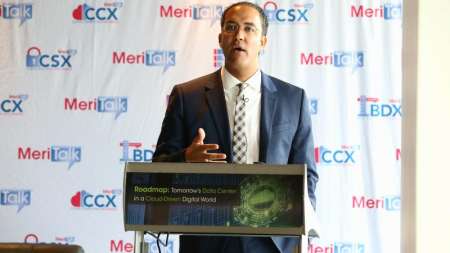In a data scientist’s dreams, the Internet of Things (IoT) would cover the Earth. And in fact, that dream might not be that far off–ground-based sensors, unmanned vehicles, mobile devices of all kinds, and satellites already combine to offer a pretty clear picture of what’s going on around us, and the resolution is only going to improve. […]
With the Internet for transportation, a lie can get all the way around the world before truth can blink itself awake. And that’s a challenge for those who seek to stem the proliferation of false information, be it accidentally misattributed quotes, political propaganda, or malicious “fake news.” Artificial intelligence can help combat the problem, by using machine learning algorithms to detect the patterns used in phony stories and ads designed to stir up fear or outrage, or, in the case of Russian disinformation, unsettle people’s faith in American institutions. […]
Despite an air of uncertainty coming from the Trump administration, the Department of Energy’s research arm is forging ahead with what it calls “transformational research,” putting up $100 million to try to ensure that it doesn’t miss a trick when it comes to potentially disruptive energy research. […]
An alliance of government agencies is taking a deep dive, as it were, into the world’s oceans as part of a larger project to develop a comprehensive environmental Earth model that could more accurately make predictions about weather and climate. The new model could enable forecasting events ahead of time, by days or even decades. […]
The Defense Threat Reduction Agency (DTRA), faced with a growing and diverse threat of chemical and biological attacks, is ramping up efforts to use technology to detect and, when possible, prevent attacks. […]
Password manager company, Dashlane, has added a twist with its list of the “Worst Password Offenders” of 2017, naming high-profile people and organizations that fell into the bad-password trap. President Trump was deemed the worst offender, primarily because of simple passwords reportedly used by cabinet members and policy directors. Outside parties were also the culprits for the Department of Defense, specifically for its contractor, Booz Allen, as well as the Republican Party (stemming from a careless data analytics firm). Paul Manafort, for using “Bond007” as a password, and Sean Spicer, for apparently tweeting his passwords, also came in for scorn. […]
Email is a core network application for both the private sector the and government, and has become an essential business communication tool. Since email is nearly ubiquitous and often poorly secured, it also has become a vector for fraud and data theft. Phishing emails can compromise not only Federal networks and databases, but also trust in government communications. […]
Last July, the Federal Risk and Authorization Management Program (FedRAMP) revamped the provisional authorization process to make life easier for cloud service providers (CSPs). The change let CSPs use a simple web form to delineate their business cases to FedRAMP’s Joint Authorization Board (JAB). […]
In a report released on Dec. 7, the Government Accountability Office (GAO) reported that while Veterans Affairs (VA) has made some progress on key IT initiatives under Federal Information Technology Acquisition Reform Act (FITARA) requirements, it has nonetheless fallen short of Office of Management and Budget (OMB) targets regarding consolidating and optimizing its data centers. […]
The White House wants to clear the way for Federal agencies to adopt commercial cloud computing, even if that means tweaking acquisition rules to help them get there. […]
SAP’s National Security Services (NS2), a U.S. subsidiary of the international software company, has secured a FedRAMP JAB authorization for its cloud-based human capital management (HCM) suite. SAP NS2’s SuccessFactors HCM suite offers a variety of products, including talent acquisition and management tools, analytics tools, and core human resource tools, all running on the Amazon Web Services’ (AWS) GovCloud platform. […]
When it comes to Artificial Intelligence (AI) regulations, should the government focus on protecting the rights of its citizens or position the United States as a global leader on the technology? This was the central question during the Senate Subcommittee on Communications, Technology, Innovation, and the Internet’s Dec. 12 hearing. […]
The flood of surveys and reports detailing the shortage of qualified IT and cybersecurity professionals is unrelenting. Estimates put the shortfall at anywhere between 1.8 million to 3.5 million in the next five years. […]
Since 2001, the Department of Veterans Affairs (VA) has tried three different modernization programs for its healthcare system. So when the department announced another plan to modernize by adopting the same system as the Department of Defense (DoD), the Subcommittee on Information Technology was skeptical and interrogated them in a Dec.7 hearing. […]
The Intelligence Advanced Research Projects Activity (IARPA) is upping the ante in automated analysis of satellite images, offering $100,000 in prizes in a competition designed to spawn breakthroughs in imagery analysis. […]
Bruce Greenstein, Department of Health and Human Services (HHS) CTO knows Feds need help combating the Opioid crisis. That’s why HHS convened the Opioid Symposium last week at the Hubert H. Humphrey Building, bringing Federal, state and industry players together to brainstorm on one of the nation’s toughest issues. Fourteen sessions later, and sharing data, innovating, communicating, and remembering the human impacts emerged as the key takeaways. […]
Since blockchain first appeared in 2009 as the digital ledger for Bitcoin cryptocurrency transactions, it has steadily taken the online world by storm, in the process practically becoming a synonym for security. Even if a lot of people still don’t know what it is, they’re beginning to hear it more and more. IBM, for instance, has taken to mentioning “blockchain for security” in its TV ads. And in a sure sign of pending mainstream acceptance, a “Blockchain for Dummies” book is now available. […]
In a move to help Federal agencies streamline and modernize their technology infrastructure, President Trump signed the Modernizing Government Technology (MGT) Act into law today. […]
In light of recent advances in performance–not to mention the history of computing–it’s reasonable to assume that artificial intelligence and machine learning systems will become smarter and faster. But government-funded research that is being put into practice at the Air Force Research Laboratory (AFRL) could achieve new levels of performance while also consuming minimal amounts of power. […]
In the seven years since it was launched, the General Services Administration’s (GSA) Challenge.gov platform has demonstrated that crowdsourcing can be a winning approach to problem solving in government. […]
Department of Defense (DoD) officials have been framing Artificial Intelligence (AI) as the center of a “new space race,” citing its growing importance in military and geopolitical operations, the investments other countries such as China have been making in AI, and Russian President Vladimir Putin’s assertion that whoever takes the lead in this field will be “ruler of the world.” […]
The Defense Department (DoD) is leading the brain-computer interface charge within government, recently investing $65 million across six projects. Each of these projects will work to develop high-resolution neural interfaces and working systems that could help in sensory restoration, specifically in these projects with regard to sight and speech. The contractors–five research organizations and one private company–will work under the Defense Advanced Research Project Agency’s (DARPA) Neural Engineering System Design (NESD) program, which was launched in 2016 with the goal of developing an implantable neural interface able to deliver high-bandwidth data transfers between the brain and electronics systems. […]
The National Institute of Standard and Technology (NIST) released the second draft of the proposed update to its Framework for Improving Critical Infrastructure Cybersecurity. The new draft aims to clarify, refine, and enhance the framework as well as “amplifying its value and making it easier to use,” NIST officials said. […]
As the Principal Deputy Director of National Intelligence, Sue Gordon has no shortage of cybersecurity data at her fingertips, but the key to cyber success is connecting the dots cross-government and in partnership with the private sector. […]
With rapid growth in smart devices, exploding data volumes, and the shift to the cloud, it is becoming more and more challenging to protect critical systems and information. Government and industry leaders convened at the Symantec Government Symposium in Washington, D.C. on Tuesday to discuss these complex challenges and the solutions needed to address them. […]
The Army is forging ahead with deployment of its Big Data Platform (BDP), a move that underscores the Department of Defense’s (DoD) plans for using open-source software, commercial technologies, and cloud services to get a grip on the data it collects from a wide range of sources. […]
The Centers for Medicare and Medicaid Services (CMS) need to more fully align its antifraud efforts with the Government Accountability Office’s (GAO) Fraud Risk Framework, GAO auditors said in a report released Dec. 5. CMS’s anti-fraud programs currently align only partially with the risk framework, GAO’s investigation revealed. […]
SBA has made it a priority to provide cybersecurity assistance for small businesses, reaching out to local chambers of commerce, technology vendors, and banks that serve small businesses to raise awareness of the benefits of cybersecurity threat prevention sharing through conferences. […]
After years of fits and starts on a much-needed electronic filing system, the Justice Department’s Executive Office for Immigration Review (EOIR) is “poised” to deploy a comprehensive, cloud-based e-file platform next year to help reduce a massive backlog of cases, a top EOIR official said recently. […]
Artificial intelligence (AI) systems are getting awfully good at the Who, What, When, Where and even How for a variety of jobs, from military operations to financial transactions to medical diagnosis and treatment. But the Why is another story. […]





























